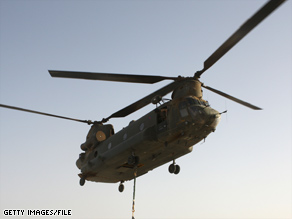Wednesday, September 24, 2008
Iraq War extended for Political Reasons
Maddow: Bush extending Iraq war for political reasons
09/24/2008 @ 9:23 am
Filed by David Edwards and Muriel Kane
Advertisement
The 2008 president campaign has been marked by continuing arguments between the parties over the most appropriate timetable for withdrawing troops from Iraq, but it has never been clear how the Bush administration had established its own proposed schedule.
However, according to MSNBC's Rachel Maddow, "We suddenly have got a lot more clarity about Iraq right now than we've had in a really, really long time."
Maddow cited an interview with Iraqi Prime Minister Maliki, conducted last week by Iraqi state television, during which "he said when he was negotiating with the Bush administration to pick a withdrawal date for our troops to come home, they initially settled on about 15 months from now, the end of 2010. But then ... the Bush administration came back and told the Iraqis they'd actually like our troops to stay in Iraq an extra year, through 2011 ... 'due to political circumstances related to the US domestic situation.'"
"So the prime minister of Iraq says on tape," Maddow summarized, "according to our own government's translation, that the Bush administration wants to prolong the war in Iraq for an extra year because of our domestic politics."
"If you feel like your hair is on fire right now," she added, "you're not alone."
When contacted by the Maddow Show, a White House spokesperson replied with familiar rhetoric, saying, "We do not have anything to announce on that. ... What we're really pleased about is the fact that we're having these discussions. ... Any decisions on troops will be based on the conditions on the ground."
"If you're keeping track at home, you're right," Maddow commented. "They are not directly denying what the Iraqi prime minister said -- which is incredible."
It was reported in early August that "Iraq and the United States are close to reaching a deal under which U.S. combat troops would leave by December 2010 and the rest would leave by the end of 2011, two Iraqi officials said Thursday. ... Two senior U.S. officials said negotiators have made progress and are close to a deal. But they also said that some issues are unresolved and that troop withdrawals would be tied to conditions on the ground."
By the end of August, however, Maliki's demands for a complete US withdrawal by 2011 were being described as "an attempt to extract further concessions from American officials, less than a week after both sides said they had agreed to remove all U.S. combat troops by the end of 2011, if the security situation remained relatively stable, but leave other American forces in place."
Maliki's latest remarks appear to be a referecne to this shift in the timetable. He told Iraqi tv, "They asked for a change (in date) due to political circumstances related to the domestic situation (in the US) so it will not be said to the end of 2010 followed by one year for withdrawal but the end of 2011 as a final date."
"The Republicans are convinced that keeping the war going is good for them politically," continued Maddow. "I think it's a political stinker. I think there's a reason why the tape you've seen over and over and over again of John McCain promising to stay 100 years in Iraq -- that's the tape that turns up in pro-Obama ads, not pro-McCain ads."
"So why are the Republicans invested in our troops staying and staying and staying and staying?" Maddow wondered. She suggested it might be significant that this Monday, for the first time since Iraq kicked out the foreign oil companies in 197, "a Western oil company opened up an office in Iraq. In a sobering reminder of the dangers of doing business in Baghdad, the company is not disclosing the location of its office."
"If you're looking for a mission to proclaim 'accomplished' in Iraq, there you have it," concluded Maddow. "This is the kind of 'accomplishment' that will keep our troops there longer."
This video is from MSNBC's The Rachel Maddow Show, broadcast September 23, 2008.
Thursday, September 18, 2008
The` Fragile State of Iraq' Means Rising Violence
The new U.S. commander in Iraq said Tuesday that security in the country has improved, but is still in a "fragile state."
"As we've said many times, everyone is encouraged by the progress that has been made here in Iraq, but we still have a lot of work to do," said Gen. Ray Odierno, who took command of U.S. forces in Iraq on Tuesday. ![]() Watch change of command ceremony »
Watch change of command ceremony »
Odierno replaced Gen. David Petraeus, whose tenure saw a reversal in the country's rising violence.
Gen Ordierno is getting a violent welcome
BAGHDAD, Iraq (CNN) -- Two bombings overnight near major shrines in the holy Shiite city of Karbala left at least three people dead and 15 others wounded, an Iraqi Interior Ministry official said Thursday.
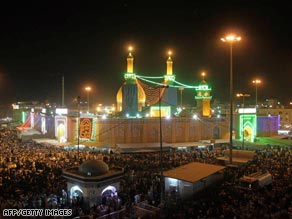
One of the blasts to hit Karbala came close to the Imam Abbas mosque, pictured here in August.
There were no claims of responsibility so far for incidents at the Imam Hussein and Imam Abbas mosques -- two of the holiest shrines for Shiite Muslims -- who regularly make pilgrimages to the sites in the south-central Iraqi city.
The first bomb, which had been placed in a trash bag, detonated shortly after 11 p.m. (4 p.m. ET) Wednesday about 800 meters (875 yards) from the Imam Hussein shrine and 200 meters (218 yards) from an Iraqi security forces checkpoint, the official said. One woman was killed and 12 others, including women and children, were wounded.
About an hour later, an explosive device placed in a car detonated about 500 meters (547 yards) from the Imam Abbas shrine, the official said. The attack killed one civilian and wounded three, and damaged a number of the houses in the area.
The two shrines are about several hundred meters from each other. Hussein, the grandson of the Prophet Mohammed, is revered by Shiites, while Abbas is Hussein's half-brother. Their tombs are located in the shrines.
BAGHDAD, Iraq (CNN) -- At least 30 people were killed and 45 were wounded by a suicide car bomb Friday in the town of Dujail north of Baghdad, the Iraqi Interior Ministry said.
The bomber struck the Dujail police station, but the casualties included only one policeman.
Almost all the casualties were outside the station because it is fortified with concrete barriers and blast walls, the ministry said.
The station is in the commercial center of Dujail, and its markets and shops were crowded with people buying food before Iftar, the Ramadan meal at which people break their fast at sunset.
Multi-National Division North issued a separate news release on the bombing, putting the toll at 31 killed and 40 wounded, and omitting the word "suicide" from its description of the truck. Coalition military casualty counts are often lower than those Two of the wounded were members of Iraqi Security Forces.
http://www.cnn.com/2008/WORLD/meast/09/12/iraq.main/index.html
The Iraqi Interior Ministry said the bomb was in a "big vehicle" carrying a very large amount of explosives.
The ministry said 15 of the wounded were in critical condition and were moved to a U.S. military medical facility nearby. Others were taken to hospitals in Dujail or nearby Balad, it said.
The attack happened around 6 p.m., shortly before sundown, it said.
Dujail, which is about 40 miles (60 km) north of Baghdad, is a predominantly Shiite town.
In 2006 Saddam Hussein was executed for crimes against humanity his regime committed in this town after a failed assassination attempt against him in 1982.
Dujail is about 40 miles (60 KM) north of Baghdad and is a predominantly a Shiite tow
Saturday
Bomber strikes in Iraq after drawing crowd to car crash
BAGHDAD, Iraq (CNN) -- At least six people were killed and 50 wounded when a suicide car bomber apparently staged a traffic accident to draw more victims to the explosion.
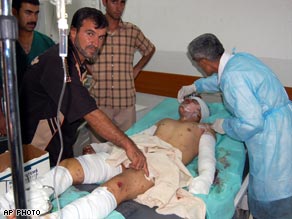
Saleh Bayati, 17 , is treated for injuries from Saturday's suicide bombing in Tal Afar.
The suicide attack happened around midday Saturday at an outdoor market in Tal Afar in northern Iraq, an Iraqi Interior Ministry official said.
The bomber got into a traffic accident and began arguing with the driver of another car, the official said. He detonated his car bomb as a crowd gathered around the shouting men, he said.
Police said the attack happened in the same market where a car bombing killed more than 24 people last month.
It comes as Muslims observe the holy month of Ramadan, a time when markets are busier than usual with people shopping for food and other items in preparation for the breaking of the daily fast at dusk.
Tal Afar, a largely Turkmen city near the Syrian border, is part of Nineveh province. Iraqi troops, backed by U.S. forces, launched an operation to crack down on al Qaeda and other Sunni insurgents in the province in May.
Also Saturday, the head of security for Iraq's minister of justice was wounded in an explosion in Baghdad. Lt. Safiih al-Zaboun was driving to his home when an explosive device attached to his car detonated, the Interior Ministry official said.
Other developments
• In Baghdad on Sunday, four roadside bombs wounded eight police officers and five civilians.
• North of Baghdad, in Diyala's provincial capital of Baquba, a roadside bomb targeting an Iraqi police patrol killed one policeman Saturday morning.
• South of Baquba, two men and a woman were killed when a roadside bomb struck the car they were traveling in on Saturday
Monday
![]()
![]()
![]()
BAGHDAD, Iraq (CNN) -- A female suicide bomber detonated explosives Monday evening in Balad Ruz, killing at least 20 people and wounding 30, according to the Interior Ministry and Col. Ragheb al-Omairi, a Diyala military spokesman.

Female Iraqi police recruits line up last week, part of the country's response to female suicide bombers.
The bomber struck as Iftar -- the meal that ends Ramadan fasting each day -- was taking place behind the home of a former U.S. detainee. Adnan Shukur had been released from U.S. custody Sunday, and his house lies behind the Balad Ruz police station.
Shukur is a former police official who was detained about a year ago, according to a security official in Diyala province.
Many people, including police officers, were at Shukur's house to congratulate him on his release.
It was not immediately clear if Shukur was among the casualties.
Balad Ruz is 37 miles (60 kilometers) east of Baquba, in Diyala province.
Wednesday
Five roadside bombs struck the Iraqi capital on Wednesday, one of which targeted the head of New Baghdad's district council, the official said. The council leader's driver was killed, while he and his security guard were wounded in the attack.
Another roadside bomb in eastern Baghdad killed an Iraqi policeman and wounded five other people.
Two other roadside bombings in the Iraqi capital wounded nine Iraqi soldiers and civilians.
Elsewhere on Wednesday, an assistant to the governor of Nineveh province was gunned down as he was leaving evening prayers in central Mosul, city police said.
Shamel Younis was walking outside the mosque when gunmen in a car shot and killed him, then fled the scene.
Thursday:
BAGHDAD, Iraq (CNN) -- A U.S. military helicopter crashed in southern Iraq early Thursday morning, killing all seven U.S. soldiers on board, the military said.
Officials have not determined the cause of the crash, but do not suspect hostile activity.
"Based on our initial reports, it is accurate to characterize this as an accident," said Maj. John Hall, a U.S. military spokesman.
The CH-47 Chinook was part of a four-aircraft convoy that was flying from Kuwait to Balad in northern Iraq. The chopper went down about 62 miles (100 km) west of Basra.
The other helicopters in the convoy did not sustain damage, Hall said.
The names of the soldiers were not released pending notification of next of kin.
Wednesday, September 17, 2008
Looking Back : Bill Clinton's defistating bombing of Iraq in 1999

Why Didn't Saddam Let The Inspectors Inspect?
Answer: Saddam believed that the US was using the inspectors to spy on him. And we were.
As reported in the Washington post:
The new disclosures suggest that both claims were true."
Arms Control Team Had No Knowledge Of Eavesdropping
By Barton Gellman
Washington Post Staff Writer
Tuesday, March 2, 1999; Page A1
http://www.washingtonpost.com/wp-dyn/content/article/2006/06/09/AR2006060900940.html

On September 11, 1998, the Editor of the New York Times wrote an editorial entitled:
So he (Saddam) will continue to fight inspection, and stall on calling off the latest in his series of inspection bans.
The what-next responsibility can only be the President's, if he does his duty -- despite his scandal and shame, despite the ever smaller number of people around him who believe in him. The duty he did not perform before is now his hope for redemption in history.
He is the President. He will have to act on the choice before him. He can tacitly, and denying it all the time, accept Iraq as the military superpower of the Middle East, the germ warfare supplier to terrorists.
Or he can order air attacks on all military and Government installations -- and hope that by missile or revolution, Saddam will be killed.
France won't like it, neither will China. And the new Yeltsin choice for prime minister turns out to be Agent Primakov himself. He is the former high K.G.B. operative -- if there are any ''formers'' among such -- who is Saddam's great supporter abroad.
So, if he is to be taken seriously, President Clinton will have to tell the U.N. that under the U.N. Charter and existing resolutions, the U.S. has the power to do it alone and, if necessary, will.
Presidents Bush and Clinton could have done that before. But the courage and skills of U.N. inspectors, the growth of the danger from Iraqi weapons, from Saddam or his traveling terrorists, eliminate any wiggle-out room for Mr. Clinton.

Dealing with Iraq was still on President's Clinton's mind, and at the to of his task list. (Clinton had previously bombed Iraq in September 1996)
The Bombing of Iraq Dec 16 1999
"Thanks to the hard work of the United Nations Special Commission (UNSCOM), U.S. targeters know a lot more about the Iraqi regime today than they did during the Gulf War in 1991. The United States and Britain now have a diagrammatic understanding of the Iraqi government structure, as well as of the intelligence, security and transport organizations that protect the Iraqi leadership. The same mission folders that UNSCOM put together to inspect specific buildings and offices in its search for concealed Iraqi weapons of mass destruction (WMD) became the basis for the targeting folders that missile launchers and pilots used in December."
William M. Arkin an independent defense analyst, spent two months in Iraq after the Gulf War and has written extensively on Operation Desert Storm wrote of the Clinton attack - code named : Dessert Fox:
It was the previous spying efforts with the weapon inspectors that made the difference.
The target list:
Of the 100 targets on the list for Operation Desert Fox in Iraq, 87 were hit. A breakdown of the seven categories and their key areas is as follows:
COMMAND AND CONTROL: 18 of 20 targets hit
Abu Rajash, Jabul Makhul, Radwaniyah, Republican (Baghdad), Sijood palaces
Ba'ath party headquarters
Iraq Intelligence Service headquarters
Ministry of Defense
Ministry of Industry
Presidential Secretariat Building
State radio and television
WMD INDUSTRY AND PRODUCTION: 12 of 12 targets hit
Biological Research Center (Baghdad University)
Ibn al Haytham missile R&D center
Karama electronics plant
Al Kindi missile R&D facility (Mosul)
Shahiyat liquid engine R&D, T&E facility
Zaafaraniyah fabrication facility (Nidda)
WEAPONS OF MASS DESTRUCTION (WMD) SECURITY:
18 of 18 targets hit
Directorate of General Security headquarters
Special Security Organization (SS0) headquarters
Special Republican Guards (SRG) headquarters
SSO Communications/Computer Center
SSO/SRG barracks (Abu Ghraib, Radwinyah, Baghdad, Tikrit)
REPUBLICAN GUARDS: 9 of 9 targets hit
ECONOMIC: 1 of 1 targets hit
Basra refinery distribution manifold
AIRFIELDS: 5 of 6 targets hit
AIR DEFENSES: 24 of 34 targets hit
Sources: U.S. Central Command, Department of Defense
Clinton as Bush. Sr. hoped from an internal change of government, fearful of the cost of an actual overthrow.
When George W. Bush came into office he was facing a considerably weak Iraq. Saddam had held onto power of a country who had one of the largest oil reserves in the world, and didn't like us (or Israel) or President Bush's father, whom Saddam had tried to assassinate in the first moths of Clinton's Presidency. Saddam was at odd with the other Arab countries for not supporting him if the first Gulf War. He stood between George W. Bush's hope of finnaly setteling the Isreali- Palistinian problem.
The George W. Bush administration just needed a reason to go to war, the sooner the better, the quicker the better, the least footprint made, the better
Friday, September 12, 2008
The Bush Doctrine Explained - More complicated then Charles Gibson's definition

What is the Bush Doctrine.
In an interview with Charles Gibson, Republican Vice Presidential hopeful Alaska Gov. Sarah Palin was asked if she agreed with the Bush Doctrine.
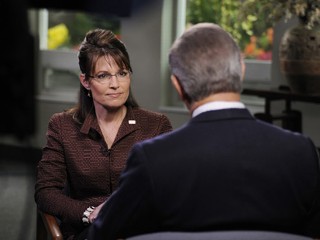
To which she responded: "In what respect, Charlie?"
To which she was informed: "... that we have the right of anticipatory self-defense."
Was Gibson's description right in his definition of the Bush Doctrine?

Charles Krauthammer wrote in an op-ed piece in the Washington Post
"There is no single meaning of the Bush Doctrine. In fact, there have been four distinct meanings, each one succeeding another over the eight years"
And Mr. Krauthhammer claims his authority on the subject:
"I know something about the subject because, as the Wikipedia entry on the Bush Doctrine notes, I was the first to use the term. In the cover essay of the June 4, 2001, issue of the Weekly Standard entitled, "The Bush Doctrine: ABM, Kyoto, and the New American Unilateralism," I suggested that the Bush administration policies of unilaterally withdrawing from the ABM treaty and rejecting the Kyoto protocol, together with others, amounted to a radical change in foreign policy that should be called the Bush Doctrine."
Unilateralism ("one+side-ism") is any doctrine or agenda that supports one-sided action. Such action may be in disregard for other parties, or as an expression of a commitment toward a direction which other parties may find agreeable.
And though Bush spoke of forming a multinational military to attack Iraq, his position was not backed by the UN Security Council, and was in divergence to it's rules.
Who defines the Bush Doctrine?
If we leave it to history we will see that in addition to Bush's dropping from treaties, that his doctrin included:
1. The United States had the right to treat countries that harbor or give aid to terrorist groups as terrorists themselves, which was used to justify the invasion of Afghanistan.[1]
2, The policy of preventive war, which held that the United States should depose foreign regimes that represented a supposed threat to the security of the United States, even if that threat was not immediate (used to justify the invasion of Iraq).
3. The belief that terrorist groups could not be treated according to the same rules as ordinary states.
Using an analogy from games theory, he said terrorist groups were not "repetitive players" who had a mutual interest in upholding the acknowledged rules of the international system (as states do); they themselves would not be inhibited in any way by the prohibition on the use of force in international law. Terrorists are more like criminals acting on a global scale, and therefore should be treated according to the "logic of police action". The police can act before a crime has actually taken place; similarly there would be a case for taking action against terrorists who had acquired a dirty bomb, even before there was concrete evidence that they were planning to detonate it imminently.
4. A willingness to pursue U.S. military interests in a unilateral way, inernational concensus is not required - but would be sought.
5. And a policy of supporting democracy around the world, especially in the Middle East. Putting democracy and human rights promotion higher on the U.S. foreign policy agenda.
One political officer at every U.S. embassy in the Middle East has democracy-promotion efforts as part of his or her portfolio. Through vehicles such as the National Democratic Institute and its Republican counterpart, the International Republican Institute, the administration now funds pro-democracy initiatives throughout the Middle East. http://www.motherjones.com/washington_dispatch/2008/01/freedom-fighters.html
Freedom Agenda
The fifth point lsisted above, of the Bush Doctrine has also been called Bush's Freedom Agenda. Some belive that this is the `lasting legacy', that President Bush wishes to be remembered by.
Charles Krauthammer writes:
"..the most sweeping formulation of the Bush approach to foreign policy and the one that most clearly and distinctively defines the Bush years: the idea that the fundamental mission of American foreign policy is to spread democracy throughout the world. It was most dramatically enunciated in Bush's second inaugural address: "The survival of liberty in our land increasingly depends on the success of liberty in other lands. The best hope for peace in our world is the expansion of freedom in all the world."
This declaration of a sweeping, universal American freedom agenda was consciously meant to echo John Kennedy's pledge in his inaugural address that the United States "shall pay any price, bear any burden, meet any hardship, support any friend, oppose any foe, in order to assure the survival and the success of liberty." It draws also from the Truman doctrine of March 1947 and from Wilson's 14 points."

The Sad Truth
The sad truth is that the Bush Presidency has left the Unted States trillions of dollars in debt, in two ongoing wars with a military bogged down and needing significant influx of money and soldiers, with a country in economic trouble, a budget debt of 50 Billion, a very low standing in world opinion, and a much less stable middle East then when his term began.
Bush has had his accomplishments - giving tax breaks to the rich and allowing oil companies to reap record profits as gas prices have almost doubled. He has brought a corporation called Haliburton back from financial problems, and has moved towards the use of private military firms such as Blackwater who are above the law, secret prisons around the world, promoted the use of torture and decrease of civil rights not just of non- American's, but of US citizens.
The Freedom Agenda was just rhetorical
For example:
1. At the United Nations lectern this week, President Bush hailed the spread of democracy. "From Beirut to Baghdad," he said, "people are making the choice for freedom." Yet even as he spoke, tanks were rolling through the streets of Bangkok as a military coup toppled the elected leader of Thailand, who at that moment was in New York for the U.N. session.
Bush made no mention of the dramatic events on Tuesday and left New York yesterday without ever seeing the deposed prime minister, much less offering any public support for a onetime strong ally of the United States. The president's spokesman later provided a strikingly mild response only after being asked by a reporter, pronouncing the White House "disappointed" by the coup
2.Bush strongly supported Gen. Pervez Musharraf, the Pakistani president who took power in a military coup.

3.. Bush supporte Kazakhstan's president, Nursultan Nazarbayev, despite the suppression of opposition parties, newspapers and human rights groups in the oil-rich Central Asian republic.
4. The administration has likewise embraced autocratic leaders in such disparate places as Azerbaijan and Ethiopia while generally tempering criticism of anti-democratic policies in Russia and China. Even in the Middle East, Bush has treaded lightly in nudging allies such as Egypt and Saudi Arabia to reform.
http://www.washingtonpost.com/wp-dyn/content/article/2006/09/20/AR2006092001696.html
Saturday, September 06, 2008
Bush spying on Iraq? Administration declines to comment.
The claims about espionage against senior Iraqi government figures appear in Bob Woodward’s book “The War Within: A Secret White House History, 2006-2008,” The Washington Post reported Friday.
Ali al-Dabbagh, a government spokesman, said Mr. Maliki’s government would seek explanations and assurances about the conduct of the C.I.A. and other intelligence agencies.
“If it is a fact, it reflects that there is no trust and it reflects also that the institutions in the United States are used to spying on their friends and their enemies in the same way,” he said. “If it is true, it casts a shadow on the future relations with such institutions.”
Haidar al-Abadi, a member of Mr. Maliki’s Dawa Party and a senior adviser to the prime minister, said that he preferred to wait until the American government answered the accusation officially. But he added, “If it is true, we will demand guarantees that this will not happen again.”
He also indicated that the concerns may run deep enough for Iraqi negotiators to seek guarantees in the continuing discussions to frame a long-term security agreement governing the continuing presence of American troops in Iraq
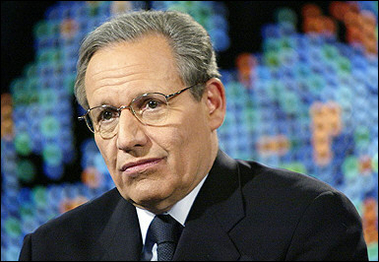
WASHINGTON POST STORY
U.S. Spied on Iraqi Leaders, Book Says
Woodward Also Reveals That Political Fears Kept War Strategy Review 'Under the Radar'
By Steve Luxenberg
Washington Post Staff Writer
Friday, September 5, 2008; A01
The Bush administration has conducted an extensive spying operation on Prime Minister Nouri al-Maliki, his staff and others in the Iraqi government, according to a new book by Washington Post associate editor Bob Woodward.
"We know everything he says," according to one of multiple sources Woodward cites about the practice in "The War Within: A Secret White House History, 2006-2008," scheduled for release Monday.
Surge not cause of decrease in violence
The book also says that the U.S. troop "surge" of 2007, in which President Bush sent nearly 30,000 additional U.S. combat forces and support troops to Iraq, was not the primary factor behind the steep drop in violence there during the past 16 months.
Rather, Woodward reports, "groundbreaking" new covert techniques enabled U.S. military and intelligence officials to locate, target and kill insurgent leaders and key individuals in extremist groups such as al-Qaeda in Iraq.
Woodward does not disclose the code names of these covert programs or provide much detail about them, saying in the book that White House and other officials cited national security concerns in asking him to withhold specifics.
Overall, Woodward writes, four factors combined to reduce the violence: the covert operations; the influx of troops; the decision by militant cleric Moqtada al-Sadr to rein in his powerful Mahdi Army; and the so-called Anbar Awakening, in which tens of thousands of Sunnis turned against al-Qaeda in Iraq and allied with U.S. forces.
The book is Woodward's fourth to examine the inner debates of the Bush administration and its handling of the Iraq and Afghanistan wars. The Washington Post will run a four-part series based on the book beginning Sunday. Fox News published a report about the book on its Web site last night after obtaining a copy ahead of the release date.
The 487-page book concentrates on Bush's leadership and governing style, based on more than 150 interviews with the president's national security team, senior deputies and other key intelligence, diplomatic and military players. Woodward also conducted two on-the-record interviews with Bush in May.
The book portrays an administration riven by dissension, either unwilling or slow to confront the deterioration of its strategy in Iraq during the summer and early fall of 2006. Publicly, Bush maintained that U.S. forces were "winning"; privately, he came to believe that the military's long-term strategy of training Iraq security forces and handing over responsibility to the new Iraqi government was failing. Eventually, Woodward writes, the president lost confidence in the two military commanders overseeing the war at the time: Gen. George W. Casey Jr., then commander of coalition forces in Iraq, and Gen. John P. Abizaid, then head of U.S. Central Command.
Bush's secrecy caused by midterm election fears
In October 2006, the book says, Bush asked Stephen J. Hadley, his national security adviser, to lead a closely guarded review of the Iraq war. That first assessment did not include military participants and proceeded secretly because of White House fears that news coverage of a review might damage Republican chances in the midterm congressional elections.

Rice was against the Surge
"We've got to do it under the radar screen because the electoral season is so hot," Hadley is quoted as telling Secretary of State Condoleezza Rice, who is described as challenging the president on the wisdom of sending additional troops to Iraq. "You're not getting a clear picture of what's going on on the ground," she told the president, the book says.
The quality and credibility of information about the war's progress became a source of ongoing tension within the administration, according to the book. Rice complained about the Defense Department's "overconfident" briefings during the tenure of Secretary Donald H. Rumsfeld. Rather than receiving options on the war, Bush would get "a fable, a story . . . that skirted the real problems," Rice is quoted as saying.
Stephan Hadley was key man
According to Woodward, the president maintained an odd detachment from the reviews of war policy during this period, turning much of the process over to Hadley. "Let's cut to the chase," Bush told Woodward, "Hadley drove a lot of this."
Nor, Woodward reports, did Bush express much urgency for change during the months when sectarian killings and violent attacks against U.S. forces in Iraq began rising, reaching more than 1,400 incidents a week by October 2006 -- an average of more than eight an hour. "This is nothing that you hurry," he told Woodward in one of the interviews, when asked whether he had given his advisers a firm deadline for recommending a revised war strategy.
In response to a question about how the White House settled on a troop surge of five brigades after the military leadership in Washington had reluctantly said it could provide two, Bush said: "Okay, I don't know this. I'm not in these meetings, you'll be happy to hear, because I got other things to do."
The book presents an evolving portrait of the president's decision-making. On the one hand, the book portrays Bush as tentative and slow to react to the escalating violence in Iraq; on the other, once he decides that a surge is required, he is shown acting with focus and determination to move ahead with his plan in the face of strong resistance from his top military advisers at the Joint Chiefs of Staff.

Administration considered impact of spying on Maliki
Woodward also depicts the development of a close working relationship between Bush and Maliki, with the president leaning on the Iraqi leader to govern evenhandedly and to take decisive action against sectarianism. "I've worked hard to get in a position where we can relate human being to human being, and where I try to understand his frustrations and his concerns, but also in a place where I am capable of getting him to listen to me," Bush told Woodward.
Given Bush's efforts to earn Maliki's trust, the surveillance of the Iraqi prime minister caused some consternation among several senior U.S. officials, who questioned whether it was worth the risk, Woodward reports. One official knowledgeable about the surveillance "recognized the sensitivity of the issue and then asked, 'Would it be better if we didn't?' "
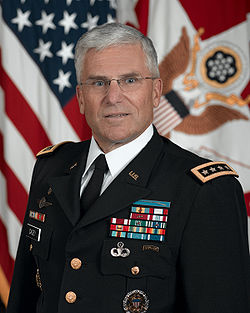
Commanding General: one big problem with the war was the president himself
Meanwhile, Woodward reports that Casey, the president's commanding general in Iraq from 2004 to 2007, came to believe that Bush did not understand the nature of the Iraq war, that the president focused too much on body counts as a measure of progress.
"Casey had long concluded that one big problem with the war was the president himself," Woodward writes. "He later told a colleague in private that he had the impression that Bush reflected the 'radical wing of the Republican Party that kept saying, "Kill the bastards! Kill the bastards! And you'll succeed." ' "
Asked about his interest in body counts, Bush told Woodward: "I asked that on occasion to find out whether or not we're fighting back. Because the perception is that our guys are dying and they're not. Because we don't put out numbers. We don't have a tally. On the other hand, if I'm sitting here watching the casualties come in, I'd at least like to know whether or not our soldiers are fighting."
The discord between Bush and Casey is one manifestation of the often-debilitating rift that Woodward portrays between the U.S. military and its civilian leadership. The book describes a "near revolt" in late 2006 by the Joint Chiefs of Staff, who felt that their advice was not reaching the president. Adm. Michael Mullen, then serving as chief of naval operations, expressed fear that the military would "take the fall" for a failure in Iraq. According to the book, Casey and Abizaid resolutely opposed the large surge that the president ultimately ordered, as did Rumsfeld. Casey went so far as to refer to Baghdad as a "troop sump." Within the administration, only the National Security Council staff strongly supported the surge plan.
Bush changes the team
In the midst of the surge debate, Bush decided to replace Rumsfeld, who had served as defense secretary throughout the war and had long argued that the United States should "take the training wheels off the Iraqi government." Bush chose Rumsfeld's replacement, Robert M. Gates, without consulting Vice President Cheney, Rumsfeld's chief patron, the book reports. Bush informed Cheney of his decision on Nov. 6, 2006, the day before the mid-term elections. "Well, Mr. President, I disagree," Cheney is quoted as saying, "but obviously it's your call."
Woodward's account also includes a portrait of Gen. David H. Petraeus, who replaced Casey in Iraq. In one scene in the Oval Office in January 2007, Bush tells his new commander in Iraq that the surge is his attempt to "double down." According to Woodward, Petraeus replies, "Mr. President, this is not double down. This is all in."

"The War Within" also tells the story of retired Gen. Jack Keane, a former Army vice chief of staff who used his high-level contacts in the White House and the Pentagon to influence war policy and major military personnel moves. A friend and mentor of Petraeus, Keane made regular visits to Iraq to advise the new commanding general and then briefed Cheney about each trip. In turn, Woodward reports, Bush sent a back-channel message to Petraeus through Keane, circumventing the chain of command.
In a critical epilogue assessing the president's performance as commander-in-chief, Woodward concludes that Bush "rarely was the voice of realism on the Iraq war" and "too often failed to lead."
During the interviews with Woodward, the president spoke of the war as part of a recentering of American power in the Middle East. "And it should be," Bush said. "And the reason it should be: It is the place from which a deadly attack emanated. And it is the place where further deadly attacks could emanate."
The president also conceded: "This war has created a lot of really harsh emotion, out of which comes a lot of harsh rhetoric. One of my failures has been to change the tone in Washington."
